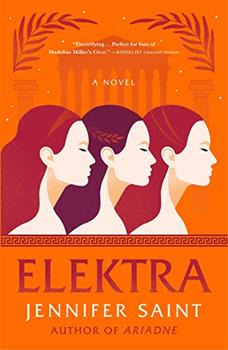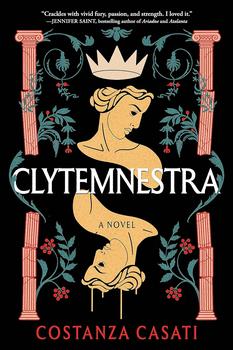Summary | Excerpt | Reading Guide | Reviews | Beyond the book | Read-Alikes | Genres & Themes | Author Bio

A Novel
by Jennifer SaintFew cultures in history mastered the art of tragedy quite like the ancient Greeks. And very few writers today can revivify those tales so artfully for a modern audience quite like Jennifer Saint. Following up on her highly acclaimed debut novel, Ariadne, which told the story of Theseus, the Minotaur and Ariadne's broken heart, Saint returns to the heroes and villains of Greek antiquity with Elektra — a timeless tale of three women caught in a vicious cycle of vengeance spawned by angry gods and cruel men.
For the Greek myth and tragedy novice, the ancient stories often present a Gordian knot of deep backstory — who did what to whom and when — requiring skillful fingers to unravel the gnarled threads. Saint is a master at this, however, beginning with her beguiling portrait of two princesses of Sparta, Helen and her twin sister Clytemnestra. They are greeting a throng of suitors for Helen's hand in marriage. Among the hundreds of men are two brothers hailing from the House of Atreus, infamous for its ancient curse of familial murder and cannibalism. The brothers, Menelaus and Agamemnon, seek to recover the royal throne of Mycenae, stolen from them in their youths.
Menelaus, desperately in love with Helen, offers himself before the most beautiful woman in the world who finds his awkward, grateful nature refreshingly "different." Standing next to him in support of his suit, Agamemnon fumes, focused only on his destiny — to reclaim his kingdom back in Mycenae. Clytemnestra is intrigued by the darker, brooding brother. Helen chooses Menelaus and stays in Sparta, as Agamemnon overthrows his throne's usurper and asks Clytemnestra to be his queen in Mycenae. So begins the inevitable march toward unimaginable tragedy.
Befitting a writer who read Classical Studies at King's College, London, Saint is faithful to the play of events, with more liberties taken where the ancient sources are silent. Such is the case with Princess Cassandra of Troy. Mentioned only briefly in the Iliad, Saint must imagine the days and nights of Cassandra's unique story and does so movingly. Daughter of King Priam and Queen Hecabe of Troy, Cassandra is introduced as a young girl witnessing her pregnant mother waking from a portentous nightmare and calling for the court seer to divine its meaning. Fascinated by Hecabe's mysterious visions, Cassandra decides to dedicate herself to the service of the god Apollo as a priestess, hoping for the gift of prophecy:
"I still coveted the hidden secret of my mother's dreams, even though the memory of that long-ago night repelled me. That was what I wanted; not a wedding, not a husband or children … Apollo had the gift of prophecy; he might yet choose to bestow it on his most devoted followers … It would be a convenient route for an inconvenient daughter."
One day, Cassandra receives her wish in a mind-shattering encounter with Apollo in his temple. Yet, when the god asks for more than Cassandra is willing to give, the gift becomes a curse. "I truly had the gift of prophecy, breathed into my mouth by Apollo himself. But no one would ever believe another word I said." Cassandra is Saint's most inspired reimagining of the three women: a walking wound, open and raw, seized with head-splitting visions of a future she and her family cannot escape. Pitied, ignored, and treated as a madwoman, her unheeded warnings of Troy's coming apocalypse reinforce that long-ago seer's interpretation of Hecabe's dream: the child, Paris, would be the ruin of Troy if allowed to live. Unable to kill their baby, Hecabe and Priam send the infant off with a shepherd; it is the return of her brother Paris from the far hills that signals the slow death spiral of Troy and all Cassandra holds dear.
Saint sets an electric pace by pivoting between the viewpoints of Cassandra, Clytemnestra, and Clytemnestra and Agamemnon's daughter Elektra. A devoted, yet sickly young girl when Helen deserts Menelaus for Paris, Elektra is heartbroken to realize the winds of war will soon carry away her adored father.
Before the Greek armies can sail, however, a terrible price must be paid to the gods. Agamemnon, in one vicious act, betrays Clytemnestra, resulting in a pain unbearable except for the promise of vengeance:
"The thought was cold and clear in my mind amid the chaos of grief and pain as I kept my vigil through the night. That pain that clawed me apart from within, tearing away at my flesh and stripping me down to nothing. Nothing but this. The hard certainty at my very core; the cold taste of iron and blood in my center that said: He will feel this too, and worse."
As the Trojan War drags on for 10 years, Clytemnestra plots her revenge, numb to both her son, Orestes, and the isolated, resentful Elektra. This long pause is where the ancient literary sources are mostly quiet except for the main points: Clytemnestra takes Aegisthus, the son of the Mycenaean usurper Agamemnon killed, as her lover and co-conspirator, plotting Agamemnon's death once he returns from the war. The days, months and years in the tomb-like palace at Mycenae are hauntingly described as Saint masterfully inhabits Clytemnestra and her cold rage, juxtaposing it as she does with glimpses of her serene, collected sister staring down from the walls of Troy. She and Helen both are "architects of their own disaster" in Elektra's eyes, because they have made horrendous choices that cry out for justice. It only remains for her father to return home from the war to mete out the justice coming to Clytemnestra, she believes. But Clytemnestra has other ideas.
Saint explores the cosmic themes of betrayal and retribution from the female eye with musical prose that cuts with sharp emotional insights. Elektra is a near non-stop reading experience with expert pacing and riveting first-person narratives from the three protagonists. Readers will eagerly await Saint's next fictional endeavor in the ancient Greek world of capricious gods and violent men.
![]() This review was originally published in The BookBrowse Review in June 2022, and has been updated for the
May 2023 edition.
Click here to go to this issue.
This review was originally published in The BookBrowse Review in June 2022, and has been updated for the
May 2023 edition.
Click here to go to this issue.

If you liked Elektra, try these:

by Caro De Robertis
Published 2025
Perfect for fans of Circe and Black Sun, this bold and subversive feminist retelling of the Greek myth of Psyche and Eros explores the power of queer joy and freedom.

by Costanza Casati
Published 2024
Madeline Miller's Circe meets Cersei Lannister in a stunning debut following Clytemnestra, the most notorious heroine of the ancient world and the events that forged her into the legendary queen.
Your guide toexceptional books
BookBrowse seeks out and recommends the best in contemporary fiction and nonfiction—books that not only engage and entertain but also deepen our understanding of ourselves and the world around us.